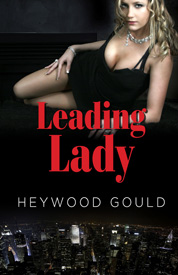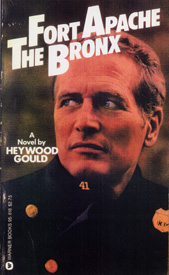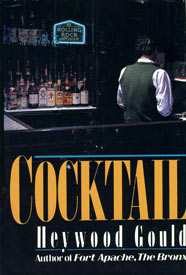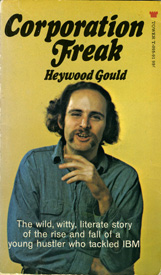RECRUITED BY THE MOB
It’s Brooklyn 1958 and nobody has ever heard of the “Mafia.”
The word is never mentioned in the black and white B movies (later reborn as noir masterpieces) which we see on rainy Saturdays. There it’s the “Syndicate,” usually located in a luxurious office with a view of downtown LA, the San Gabriel mountains super-imposed in the distance. In the movies, the “boss” is a sleek, well-tailored, well-spoken Robert Ryan-Albert Dekker-Kirk Douglas kind of guy. There is no one who even remotely resembles “Louie from Fulton Street.” who sells fresh fish on beds of ice out of the trunk of his Buick Regal on Prospect Avenue every Friday. Or Rizzo, a hunchback, who occasionally shows up at our apartment door, peeking around me to call my father, “Hey Boinie, I got somethin’ nice for the missus.” And, after a quick confab on the back stairs sells him a watch or a pair of earrings for my mother. My father buys a gold Rolex from him for $85 which he sells for $11,000 thirty years later.
Nobody in the movies looks like Mr. Leo, a shrunken old man in a brown suit who sits at the end of the counter in Tony’s candy store cashing checks for the black and Puerto Rican washer-ironer-folder women from the Pilgrim Laundry with a “hiya doll,” and a “how much you need sweetheart?” So, in 1963, when apostate mobster Joe Valachi tells the world that all of these men are loyal to a tightly controlled hierarchical organization modeled on the Roman legions we find it hard to believe.
It’s summer and my prowess in stickball has led me into bad company. We play in the schoolyard of PS 154; five man teams, two dollars a game and the right to hold the court. I hit the ball over the fence onto the steps of the whitestones across the street. After the game, one of the losers, a stocky kid with a husky voice runs at me. “Who you think you are, Mickey Mantle…?” I flinch, thinking he’s going to hit me, but he grabs me in a headlock and gives me a friendly nougie. “Now you’re playin’ for us.”
His name is Andrew. I’m taken by his supreme self-confidence, the knowing laughter in his black eyes. His older brother Johnny Boy drives us to the games in a red Impala convertible. We’ve been using the ten cent balls made out of two rubber spheres that split in two when you hit them on the seam. Johnny Boy opens a box of “Spaldeen” Hi Bouncers, 27 cents apiece. One piece, hard rubber, I hit them almost twice as far.
We travel all over Brooklyn, playing in schoolyards and on ruined streets in industrial areas where weeds push through the buckled roads. I see guys in knit shirts and slacks, passing money and I realize these older men are betting with Johnny Boy. I overswing and hit grounders.
Johnny Boy laughs at my nerves. “Whaddya worryin’ about, it ain’t your money…” After the game, win or lose, he takes us to Jahn’s Ice Cream Parlor on Church Avenue where we get the Kitchen Sink, a sundae with 32 scoops plus syrup, nuts and bananas.
On Sunday afternoons I am invited to Andrew’s house for “dinner.” He lives with his family–brothers, nieces, nephews, grandparents– in a four story brownstone in Red Hook. We eat in the back yard under a vine covered trellis. I sit at the foot of a long table with Andrew and Johnny Boy, trying not to look at their sister Rose’s huge breasts. Andrew’s dad is at the head drinking wine out of a gold-plated goblet. There are platters of roast chicken, salad with bottles of Kraft’s French, ziti with sausage, meatballs, chunks of veal and stuffed pig skin. I rise to bring my plate into the kitchen.
“Whaddya tryin’ to do, take the girls’ jobs away? ” Andrew’s father calls.
“He just wantsa get in the kitchen with Rosie,” Johnny Boy says and everybody laughs.
One Sunday, Andrew takes me aside. “Can you meet me later?”
At midnight I sneak out and ride my bike to 19th. Street, alongside the Brooklyn Queens Expressway, which was built when the city invoked eminent domain and demolished thousands of homes. Andrew gives me an ice pick. “See that baby blue El Dorado in the middle of the block? Rip up his tires, all four of ‘em.” His eyes gleam under the streetlight. “Rip ‘em to shreds…”
I’ve never done anything like this, but the movies have taught me how. I run low to the ground like the soldiers in “Battleground.” The lights are on in the house behind the El Dorado. I scramble around the driver’s side and plunge the pick deep into the tires. They deflate and start to sink. A figure appears at the window. I duck under the car and slash the rear tire on the other side, then scamper all the way around, using the car as cover, and puncture the front tire.
Andrew crouches behind the car. He reaches up and pours something down the grille onto the engine. “Fish oil,” he whispers as we run down the block. “Every time he starts the car he’ll get this stink and he won’t know where it’s comin’ from.” He’s shaking with silent laughter. “It’ll get worse and worse and nothin’ he can do about it…”
“Who is this guy?” I ask.
“Friend of my Uncle Artie’s…”
Andrew picks me up the next day. My mother won’t let him leave without eating. I cringe as she gives him a cream cheese and cucumber sandwich on pumpernickel; chopped eggs with chicken fat and fried onions; a piece of my grandmother’s cherry strudel. To me it pales in comparison with his mother’s ziti. He wolfs it down and thanks her, politely. “You have a nice friend for a change,” my mother tells me later.
“Wanna work at my Uncle Victor’s?” Andrew asks. He takes me to an empty store on Sackett Street, near the docks. A dumpy, cross-eyed guy looks me up and down. “Make a muscle, kid.” He squints dubiously at my skinny arms. “Gotta do push ups and chins.”
His name is Walter and he’s in charge. He leans a bridge chair against the wall and sits there all day, smoking Kools, reading the Daily Mirror and taking pulls on a quart bottle of Ballantine Ale. Andrew and I sit at the curb playing Casino. Once in awhile a truck rolls up and Walter calls: “Hey guys, you wanna get this?”
Sometimes it’s racks of suits or fur coats. Sometimes boxes of .45′s or LP’s or cases of J&B scotch. Anxious to prove myself I jump into the truck and hand the goods down to Andrew who puts them on a hand truck and wheels them into the store.
At the end of the day Walter peels two twenties off an enormous roll. “Don’t do nothin’ I wouldn’t do,” he says.
I realize I’m dealing with stolen goods or “swag,” as Andrew calls it, but for some reason I don’t think I’m breaking the law.
One day a nervous guy in a bloody smock pulls in with a truck full of sides of beef. “Hurry up, I gotta get back,” he says.
We have to carry the half-frozen meat down a ramp and into the store. Andrew jerks the sides onto his shoulder. I can’t get them up that high and have to hold them below my waist, straining my back. Walter watches in amusement. When the last side has been dumped he raises my arm in victory. “Winner and new champeen…” Slaps me on the behind. “You got guts…” And slips me an extra ten dollar bill.
Walter is an ex boxer. “Middleweight,” he says. “Toughest division in the fight game in those days.” I’m a worshipful listener to his stories. He talks about club fights–”Sunnyside, Eastern Parkway Arena…”–working his way through the prelims–”La Motta, Graziano, Joey Maxim, I seen ‘em all in those days.”– and crooked managers. “If I’d have had a connected manager I woulda gone right to the top. As it was I was just a cockeyed mick from Brooklyn with nobody behind me.”
Walter says he had a hundred forty-seven fights. “You fought twice a week in those days,” he says. “Now it’s twice a year for some of these guys. But I can still do the times table– two times two, three times three. I know guys who can’t even wipe their own asses anymore.”
He puts his arm around me. “Like my stories, huh? Come up to my room one of these days, I’ll show you my scrap book…”
One morning a flatbed with a high wooden fence around it is waiting as we come to work. The driver, a big, red-faced guy lunges at us. “Snap to it…”
Walter saunters around the corner with his paper, bridge chair and quart of Ballantine’s. “Mornin’ all.”
“Get goin’,” the driver says. “I been on the road all night.”
He opens the gate onto about fifty crates of live chickens. Half-dead really, some of them already gone. It looks like they just jammed as many chickens as they could into the crates and then nailed the crosspieces over them. The clucks and squawks are subdued, but the smell is overpowering and the flat bed is slick with droppings.
I try to lift a crate and can hardly move it. Even Andrew is straining so we decide to lift them together. Chickens peck at our hands. We have to put the crates on the edge of the truck, step off, lift them again and carry them into the store.
The driver watches with his arms folded. “Why don’t you get some decent guys for this?” he says to Walter.
“”What do they weight a hundred and a half?” Walter says.” If you’re in such a hurry why don’t you give the kids a hand?”
“I loaded em,” the driver says. “You unload ‘em. That means you, too, Pop.”
Walter waves his wad of bills. “I do the real heavy liftin’ around here, pal.”
The driver stands over Walter, clenching his big fists. “Get off your ass and unload these fuckin’ chickens or I’ll throw you on the truck with ‘em…”
“Okay, keep your shirt on,” Walter says, getting up.
We watch as they walk back toward the truck. Walter looks so small and hunched, next to this big guy. Tears of helpless humiliation rise in my eyes.
Walter stops to light a Kool and the driver walks a few steps ahead.
“Hey pal,” Walter says.
The driver turns and Walter hits him in the ribs with his right. He doubles over and Walter hits him under the chin with his left. It sounds like billiard balls colliding. The driver’s head snaps up. He staggers backwards, clawing the air until his feet slide out from under him and he goes down with a crash, banging his head against the fender.
A ribbon of blood flows out of the side of his mouth.
“Musta bit his tongue,” Walter says.
I’m amazed and triumphant. A bully has been defeated.
“How’d you do that?” I ask.
Walter shrugs. “You spend eight hours a day in the gym for twenty years you better learn how to throw a punch…Hose him down, Andrew.”
Walter watches as Andrew runs water over the driver until he finally stirs. Then nudges him with his foot.
“Get to work if you wanna beat the traffic.”
The driver rises to his hands and knees until his head clears. Then wobbles to his feet. Without a word he starts taking the crates off the truck. I hold the door open for him.
“C’mere,” Walter calls sharply. “He don’t need no help.”
It takes him an hour. He’s still woozy when he finishes and sits on the running board of his truck before getting up.
“Kid’s got your money,” Walter says, pointing to me.
I have seventy-nine cents in my pocket.
“Give it to him,” Walter says.
The driver stares at the coins in his dirty, callused palm.
“Seeya next time, pal,” Walter says.
As the truck pulls away Walter turns to us with a laugh. “If he thinks he caught a beatin’ now wait’ll he gets back upstate with seventy-nine cents.”
An hour later Johnny Boy drives up with an angry man in a rumpled suit. As the man speaks to Walter we tell Johnny Boy what happened.
“They say a fighter never loses his punch,” he says. “Walter was good in his day.”
“He could have been big, but the managers didn’t back him,” I say, full of indignation.
“Nobody would touch him after he did time,” Johnny Boy says. “They caught him humpin’ his nine year old nephew on the roof. He got nine years. Sat out the war.”
The next day I can’t go back to the store. Can’t face Andrew. I’m sick with the memory of Walter slapping my behind and putting his arm around me. Of his beery proposition…”C’mon up to my room I’ll show you my scrapbook.” It takes me a week to get over it and start masturbating again.
Fifteen years later I’m working as a bartender in a mob-owned disco in Times Square. Through the smoke and the strobes I recognize Andrew at the end of the bar. He’s the guy in the suit now, but still has that knowing laugh in his eyes.
“Bartending, huh?” he says. “I woulda figured you for somethin’ better.”
No point in explaining that I’m a writer picking up some extra money.
“How’s Johnny Boy?” I ask.
“He passed away a coupla years ago,” Andrew says and then quickly: “How’s your mom? Still with us?”
“Still with us,” I say.
He turns to the two guys behind him.
“His mother was some cook. Made the best egg salad I ever ate.”




